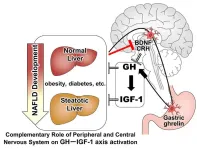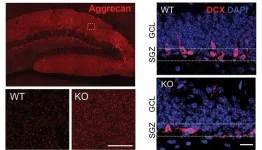Niigata, Japan – The research group of Professor Kamimura in Niigata University have demonstrated the complementary role of peripheral and central nervous system on GH–IGF-1axis activation to prevent MASLD progression. IGF-1 ameliorates fatty infiltration in the liver. Its release is controlled by GH and GH activation is managed by peripheral or central nervous system. However, the role of this axis in MASLD developmental phase has not been well identified. Our study demonstrated that the GH–IGF-1 axis is significant in inhibiting the progression of MASLD. In addition to the peripheral autonomic nervous system activating gastric ghrelin to release GH, hypothalamic BDNF and CRH are keys in central nervous system for GH expression. “IGF-1 release by the nervous system is the key factor in maintaining the pathological homeostasis of MASLD, suggesting its therapeutic potential.” says Prof. Kamimura.
END
Involvement of brain peptide dynamics in the pathology of fatty liver disease
GH–IGF-1 axis and brain peptide in MASLD pathology
2023-11-03
(Press-News.org)
ELSE PRESS RELEASES FROM THIS DATE:
How to measure improvement in Long COVID identified in an international consensus study
2023-11-03
Researchers have reached an agreement on how best to measure the severity and impact of Long COVID by identifying a “Core Outcome Measure Set” (COMS).
The research, published in Lancet Respiratory Medicine is co-led by the Institute of Psychiatry, Psychology & Neuroscience (IoPPN) at King’s College London and in collaboration with the World Health Organisation (WHO).
COMS are designed to help researchers and clinicians measure symptoms and impacts of disorders such as Long COVID in the same way, which optimises how data can be compared and summarised. Researchers say this will accelerate the understanding of, and the development ...
Human insulin less temperature-sensitive than previously thought
2023-11-03
A new Cochrane review has found that insulin can be kept at room temperature for months without losing potency, offering hope to people living with diabetes in regions with limited access to healthcare or stable powered refrigeration. This affects millions of people living in low- and middle-income countries, particularly in rural areas, as well as people whose lives have been disrupted by conflict or natural disasters.
Human insulin is a hormone produced by the body that helps turn food into energy and controls blood sugar levels. People with diabetes cannot make enough insulin and those with type 1 diabetes have to inject insulin several times a day, typically before every meal. ...
Study reveals untapped potential to increase eye donations needed for sight-restoring surgeries
2023-11-03
EMBARGOED: Not for Release Until 00:01 AM (UK Time) on Friday 3 November 2023
New research highlights the need for routine discussions about eye donation in end-of-life care clinical settings
Less than four per cent of eligible patients in end-of-life care settings were asked to consider eye donation
Patients had positive views about eye donation, but most did not know it could be an option for them
Staff need training and guidance to support discussing eye donation with patients
A new study has found there is significant scope to increase the number of eye donations from patients cared for in hospice and palliative care settings - donations which are desperately needed for ...
Penn Medicine researchers develop gene editing approaches for phenylketonuria treatment
2023-11-02
PHILADELPHIA— Phenylketonuria (PKU) is a rare newborn genetic disease that impacts between 1 in 10,000 to 1 in 20,000 people, depending on the individuals’ genetic ancestry. PKU causes an amino acid—called phenylalanine (Phe)—to build up in the bloodstream. Uncontrolled PKU can lead to intellectual disability, psychiatric issues, and seizures. While current therapies can partially improve outcomes, they require meticulous, lifelong compliance that is very difficult for most patients. ...
Mount Sinai researchers detail mechanism of a key protein implicated in age-related brain dysfunction
2023-11-02
Mount Sinai researchers have shed valuable light on the mechanism of a key protein that regulates the plasticity and function of the hippocampus, a key brain region involved in memory and learning, and that decreases with age in mice.
The team’s findings, published in Molecular Psychiatry, could pave the way for a better understanding of how the protein, known as tissue inhibitor of metalloproteinases 2 (TIMP2), could potentially be targeted in age-related disorders like Alzheimer’s disease to help restore ...
UH researcher tackles mysterious Z-RNA structure and its potential connection to diseases
2023-11-02
University of Houston Assistant Professor of Biology and Biochemistry Quentin Vicens has been awarded a $1.2 million grant from the National Institute of General Medical Sciences to unravel the mystery of Z-RNA – an enigmatic RNA structure within our cells that plays a critical role in immune response. This work is in collaboration with the laboratory of Beat Vögeli, associate professor at the University of Colorado and co-recipient of the award.
Vicens, Vögeli and their research teams are on a mission to understand how Z-RNA forms, how often it appears in our genetic material and what it means for ...
Different antibiotics’ effects on gut microbes may impact hypertensive organ damage
2023-11-02
Highlights
In a preclinical study, altering the intestinal microbiome with narrow-spectrum antibiotics affected organ damage associated with hypertension.
Results from the study will be presented at ASN Kidney Week 2023 November 1–November 5.
Philadelphia, PA (November 2, 2023) — New research in rodents indicates that altering gut microbes may affect the development of organ damage associated with hypertension. The findings will be presented at ASN Kidney Week 2023 November 1–November ...
Are sodium-glucose cotransporter-2 inhibitors safe for patients with diabetes and cancer?
2023-11-02
Highlights
Investigators found that in patients with diabetes and cancer, sodium glucose cotransporter-2 inhibitors were associated with a higher risk of diabetic ketoacidosis and fracture and a lower risk of acute kidney injury and urinary tract infection compared with glucagon-like peptide 1 receptor agonists.
Results from the study will be presented at ASN Kidney Week 2023, November 1–November 5.
Philadelphia, PA (November 2, 2023) — Sodium-glucose cotransporter-2 inhibitors (SGLT2i) have heart- and kidney-related benefits for patients with and without diabetes ...
Wildfire air pollution may increase risks of hospitalization and death among patients on dialysis
2023-11-02
Highlights
Among individuals receiving in-center hemodialysis treatment in Washington, Oregon, and California, exposure to wildfire-related air pollution was associated with elevated risks of hospitalization and mortality.
Results from the study will be presented at ASN Kidney Week 2023 November 1–November 5.
Philadelphia, PA (November 2, 2023) — In analyses of data from western US states, increases in wildfire-related air pollution around dialysis clinics were linked to higher rates of hospitalizations and deaths among patients. The research will be presented at ASN Kidney Week 2023 ...
Simple automated tool prompts physicians to screen patients with diabetes for kidney disease
2023-11-02
Highlights
A tool that provides an automated prompt to physicians increased kidney disease screening in patients with type 2 diabetes.
Results from the study will be presented at ASN Kidney Week 2023 November 1–November 5.
Philadelphia, PA (November 2, 2023) — Investigators have implemented an automated health maintenance tool created by the National Kidney Foundation into electronic medical records to prompt primary care physicians to screen for chronic kidney disease (CKD) in adult patients ...
LAST 30 PRESS RELEASES:
Increasing the number of coronary interventions in patients with acute myocardial infarction does not appear to reduce death rates
Tackling uplift resistance in tall infrastructures sustainably
Novel wireless origami-inspired smart cushioning device for safer logistics
Hidden genetic mismatch, which triples the risk of a life-threatening immune attack after cord blood transplantation
Physical function is a crucial predictor of survival after heart failure
Striking genomic architecture discovered in embryonic reproductive cells before they start developing into sperm and eggs
Screening improves early detection of colorectal cancer
New data on spontaneous coronary artery dissection (SCAD) – a common cause of heart attacks in younger women
How root growth is stimulated by nitrate: Researchers decipher signalling chain
Scientists reveal our best- and worst-case scenarios for a warming Antarctica
Cleaner fish show intelligence typical of mammals
AABNet and partners launch landmark guide on the conservation of African livestock genetic resources and sustainable breeding strategies
Produce hydrogen and oxygen simultaneously from a single atom! Achieve carbon neutrality with an 'All-in-one' single-atom water electrolysis catalyst
Sleep loss linked to higher atrial fibrillation risk in working-age adults
Visible light-driven deracemization of α-aryl ketones synergistically catalyzed by thiophenols and chiral phosphoric acid
Most AI bots lack basic safety disclosures, study finds
How competitive gaming on discord fosters social connections
CU Anschutz School of Medicine receives best ranking in NIH funding in 20 years
Mayo Clinic opens patient information office in Cayman Islands
Phonon lasers unlock ultrabroadband acoustic frequency combs
Babies with an increased likelihood of autism may struggle to settle into deep, restorative sleep, according to a new study from the University of East Anglia.
National Reactor Innovation Center opens Molten Salt Thermophysical Examination Capability at INL
International Progressive MS Alliance awards €6.9 million to three studies researching therapies to address common symptoms of progressive MS
Can your soil’s color predict its health?
Biochar nanomaterials could transform medicine, energy, and climate solutions
Turning waste into power: scientists convert discarded phone batteries and industrial lignin into high-performance sodium battery materials
PhD student maps mysterious upper atmosphere of Uranus for the first time
Idaho National Laboratory to accelerate nuclear energy deployment with NVIDIA AI through the Genesis Mission
Blood test could help guide treatment decisions in germ cell tumors
New ‘scimitar-crested’ Spinosaurus species discovered in the central Sahara
[Press-News.org] Involvement of brain peptide dynamics in the pathology of fatty liver diseaseGH–IGF-1 axis and brain peptide in MASLD pathology



